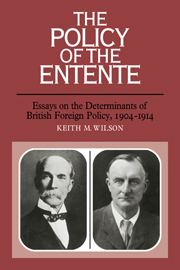Book contents
- Frontmatter
- Contents
- Acknowledgements
- Introduction
- 1 The Poverty of the Entente Policy
- 2 The Politics of Liberal Foreign Policy I
- 3 The Politics of Liberal Foreign Policy II
- 4 The Dissimulation of the Balance of Power
- 5 The Fiction of the Free Hand
- 6 The Invention of Germany
- 7 The Military Entente with France
- 8 The Cabinet's Decision for War, 1914
- Notes
- Bibliography
- Index
5 - The Fiction of the Free Hand
Published online by Cambridge University Press: 04 August 2010
- Frontmatter
- Contents
- Acknowledgements
- Introduction
- 1 The Poverty of the Entente Policy
- 2 The Politics of Liberal Foreign Policy I
- 3 The Politics of Liberal Foreign Policy II
- 4 The Dissimulation of the Balance of Power
- 5 The Fiction of the Free Hand
- 6 The Invention of Germany
- 7 The Military Entente with France
- 8 The Cabinet's Decision for War, 1914
- Notes
- Bibliography
- Index
Summary
With the balance of power, the principle of the free hand dominated statements purporting to describe the aims and essentials of British foreign policy in the late nineteenth and early twentieth centuries. The two principles were brought together well in one report sent from the Paris Embassy on 1 May 1913 by the First Secretary there, whose interlocutors had declared that ‘England was today the arbiter of Europe. She could do what she liked.’
At the turn of the century Sir William Harcourt had invoked Canning to the effect that England should be ‘the friend of all states, but the instrument of none’. Shortly afterwards, two future Prime Ministers had made similar declarations. Asquith was unable to imagine anything ‘which can in the least compensate us for the loss of the freedom to act, or not to act, according as our own interests and conscience dictate’. Campbell-Bannerman referred to a ‘freedom of individual action’ that was ‘of immense importance to this country’. Campbell-Bannerman's and Asquith's Foreign Secretary was Sir Edward Grey. At a meeting of the Committee of Imperial Defence which included the Prime Ministers of the Dominions, on 26 May 1911; Grey said: ‘We are not committed by entanglements which tie our hands. Our hands are free.’ In the House of Commons, on 3 August 1914, he maintained: ‘as regards our freedom to decide in a crisis what our line should be, whether we should intervene or whether we should abstain, the Government remained perfectly free, and, a fortiori, the House of Commons remains perfectly free’.
- Type
- Chapter
- Information
- The Policy of the EntenteEssays on the Determinants of British Foreign Policy, 1904–1914, pp. 85 - 99Publisher: Cambridge University PressPrint publication year: 1985



